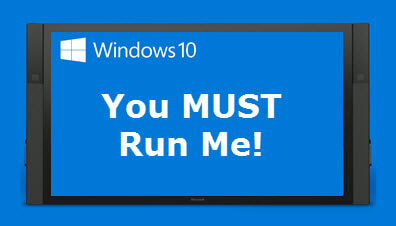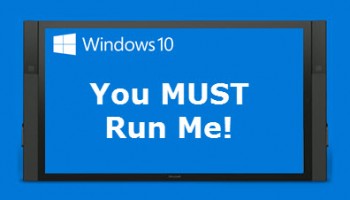Microsoft has announced significant changes to its Windows 7 and 8.1 support policy which will effectively force owners of PCs fitted with the latest processors to run Win 10.
Until now, Windows users have enjoyed considerable freedom to combine older operating systems with newer hardware per medium of Microsoft’s commitment to providing updates supporting new technology and drivers. In a recent official announcement, Microsoft’s Terry Myerson has confirmed that this type of support will not be ongoing for Windows 7 and 8.1.
Windows 7 and 8.1 will continue to be supported for security, reliability, and compatibility through January 14, 2020 and January 10, 2023 respectively on previous generation silicon. Going forward, as new silicon generations are introduced, they will require the latest Windows platform at that time for support. For example, Windows 10 will be the only supported Windows platform on Intel’s upcoming “Kaby Lake” silicon, Qualcomm’s upcoming “8996” silicon, and AMD’s upcoming “Bristol Ridge” silicon.
Recent Intel Skylake buyers will have 18 months grace in which to upgrade their systems to Windows 10. However, the grace period does not apply for everyone, Microsoft has provided a list of Intel Skylake models and OEMs (Dell, HP, Lenovo, NEC) that will be eligible for the extended support: Skylake systems supported on Windows 7 and Windows 8.1 (the list will be updated as new supported models are released).
Through July 17, 2017, Skylake devices on the supported list will also be supported with Windows 7 and 8.1. During the 18-month support period, these systems should be upgraded to Windows 10 to continue receiving support after the period ends.
How Much Impact Will This Have?
What will happen if/when users try running Windows 7 or 8.1 on new unsupported silicon? That’s the $64 million question, which probably won’t be fully answered until real world experiences come to the fore. Some pundits are predicting serious consequences while others see it as more of a scare tactic. My guess would be that, eventually, the impact will be quite significant.
This decision clearly reinforces Microsoft’s determination to move the entire Windows ecosystem to Windows 10. While this almost certainly won’t be a popular decision, I do have some sympathy for Microsoft’s approach. After all, the whole idea behind Windows 10 is to get as many users on the same platform as possible. One can only imagine how much money maintaining the current fragmented support infrastructure must gobble up.
One thing for sure; the gap between users’ enthusiasm for new hardware and their attachment to older software has now been considerably widened.



It always seems to be about corporations and how much money they need to make. But it looks like Intel gone from a super king-size bed to a twin bed with MS.
What about Linux and it’s off-spring or even MAC OS? Will they work or be shut out by these same MS Windows 10 only cpus?
They’re not exactly Windows 10 only CPUs Roo, and Linux and Mac will not be affected in any way. There’s every chance that older Windows OSs will also run fine on the next-gen silicon but, because MS will not be updating them, they certainly won’t be able to take advantage of new features and/or technology.
At this stage, nobody knows for sure how this will all pan out, I guess it depends largely on just how different or more advanced the next-gen technology will be. If there’s a radical difference, or new drivers are required, then the older operating systems may not run at all. On the other hand, if the differences are minor, it may be quite some time before Win 7 and 8.1 are affected.
Thanks Jim!
This should add fuel to the “conspiracy theory”.
Hi,
In regards to updating to either Win8 or 10: I have an HP laptop and switched to Win8 when it first came out. I lost my audio because there was no utility to update Conexant. So I was forced to go back to Win7 after taking my PC tomy computer guy. It was a real naibiter there for a while. HP was of no help either in helping or replacing the audio system. I’m wondering now what’s going to happen when Microsoft stops supporting the system. Will I be forced in replacing my laptop?
Thanks, love your newsletter.
Sue Wolf
Fixing missing audio shouldn’t normally present a problem Susan, especially for a “computer guy”. Audio is a pretty basic function and in most cases Microsoft’s generic driver should do the trick.
No, you’ll be fine Susan. This move by Microsoft only affects older operating systems running with the latest/newest processors. Windows 7 and 8 running on existing processors will still be fine.
So I assume something must be hard coded in the CPU for it to realise what windows version it is being run on?
No, the processors will just be normal CPUs. This is all about the operating systems being updated to support newer hardware.
In the past, Microsoft has issued updates for older operating systems so they include support for newer hardware, including CPUs and more advanced technology. This has meant that the operating systems have kept pace with hardware advancements. That will no longer be the case. As newer more advanced CPUs are released, Microsoft will not be updating Windows 7 and 8.1 to include support for same.
ok, thanks, I hadn’t realised the updates you get added support for new CPU’s…I just thought you inserted a new one and off you went. So that would mean before you installed a new latest model CPU you would want to get all updates first?
I don’t get this grace period thing. Either it works, or it doesn’t. If processor X works with OS Y at some point, and then it doesn’t, obviously this means OS Y has been “updated” in some way to break compatibility. How can this be necessary, or even useful (for the user, I mean) ?
Since Microsoft would have us believe that Windows 7 is an old, rotting piece of software that is better abandoned, what sort of “enhancement” would it bring to it which would break compatibility ?
Even if we accept Microsoft’s narrative (Windows 7 bad, Windows 10 good), then it seems obvious that all sane people (i.e. gobbling up Miscrosoft’s propaganda) must move to Windows 10, because that’s where “progress” and “enhancements” happen.
Stupid people (like me, for instance), who insist on staying with Windows 7, will be punished by not getting those wonderful “enhancements”, full stop.
Now, we are supposed to believe that Microsoft is so eager to help Windows 7 lovers… that it works itself into a lather to bring enhancements to Windows 7… so radical, so marvelous that they will break compatibility… but hey, you’ll get such a better Windows 7 ! Which we told you not to use, anyway !
Microsoft is insulting its users’ intelligence.
The grace period is to cover those who may have purchased and are running the latest Intel Skylake processor which was released just prior to this announcement. I’m guessing Skylake must include a feature or technology which isn’t supported by Windows 7 and 8.1 – it’s a kind of transition period during which the older operating systems will be updated to include full support for the Skylake technology.
I agree with you, I see this as mostly just another scare tactic to get more people upgrading to Win10. Unless CPU technology changes dramatically in the near future, I can’t see users being adversely affected for quite some time. And those who just continue running Windows 7 and 8.1 on existing processors won’t be affected at all.
It’s clear to me that the event I have been so steadfastly avoiding for more than a decade is now definitely on the horizon. I use two laptops and a desktop, all running a “stripped down” version (i.e., all the garbage removed) of Windows 7. Seamless networking among the three of them. Few problems.
But when the hardware finally gets to the point where it won’t function effectively anymore, and an upgrade is required, I will make the change to Mac. It’s just not worth playing games anymore with Mother Microsoft. If this isn’t a classic example of what happens under a monopoly, I don’t know what is…
Be careful what you wish for, Bill. Apple has dropped support for older processors twice.
https://en.wikipedia.org/wiki/Apple's_transition_to_Intel_processors
My first reaction to reading the title was to wonder if the new CPU’s would be hard coded to only accept Windows 10.
If that’s what the title implied, I apologize. However, for the title to mean that it would have to read “New Processors Only Support Windows 10” – the inference in that case being that the CPUs are supporting the OS.
With “New Processors Only Supported BY Windows 10” the inference is clearly the other way round – that the OS is supporting the CPUs.
aye, that is what caught my eye and the way I understood this article. Apology accepted. 🙂